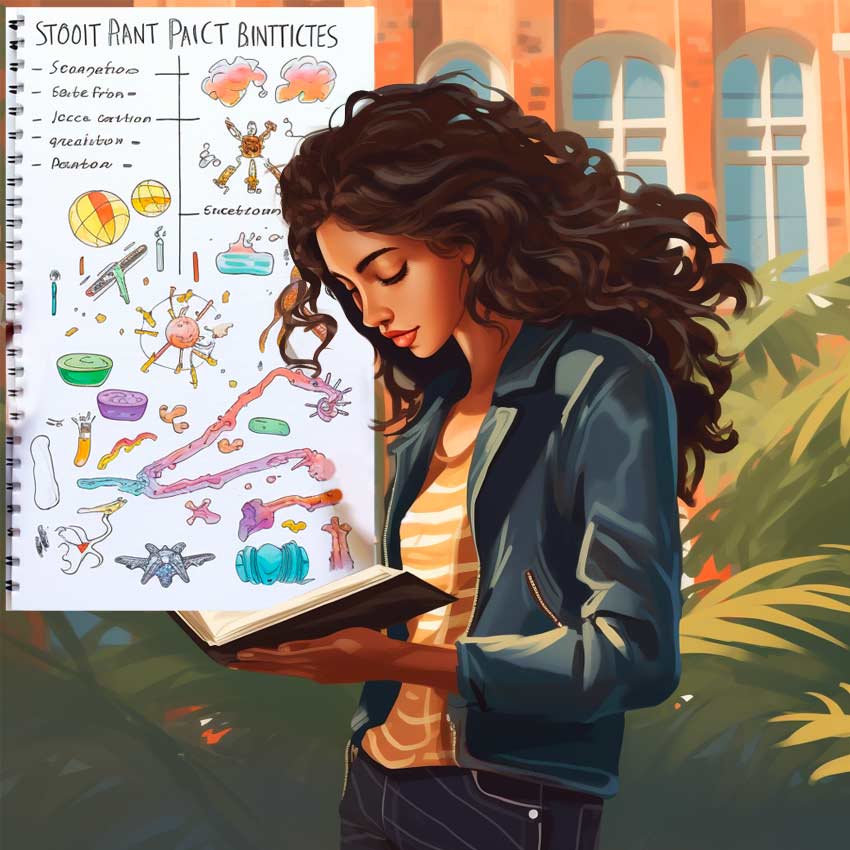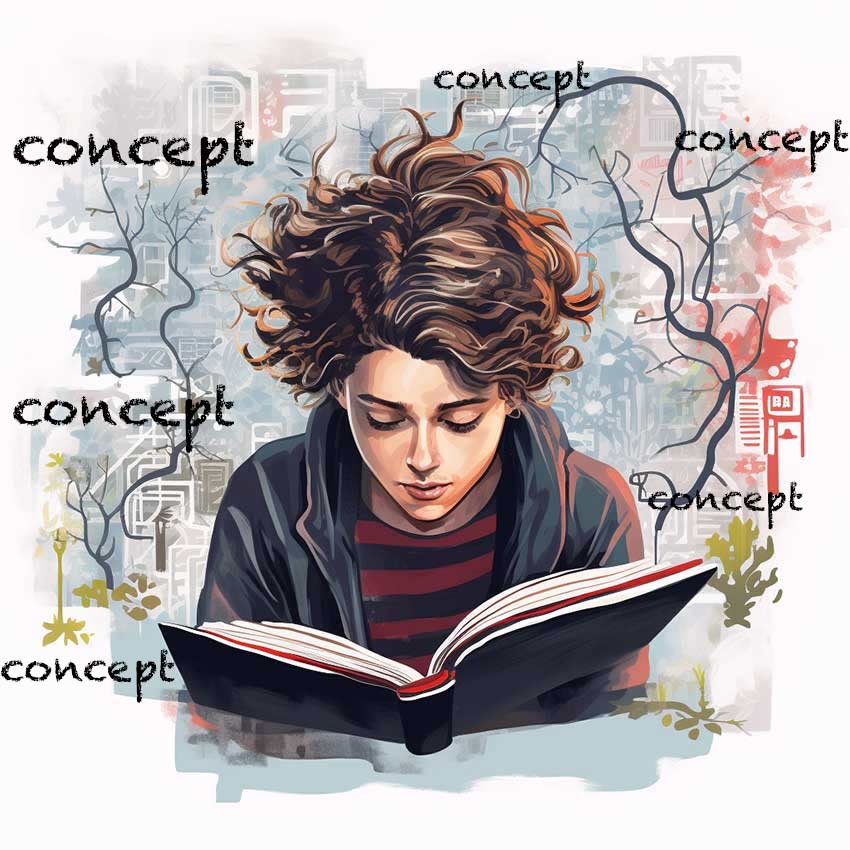Want to study smarter? Explore a world of learning possibilities with our guide to different types of study methods. Revolutionise your study time!

We all have a love-hate relationship with studies. Studying makes us crazy at times, but also can be real fun when our favourite subjects are involved! But exams – ah, that’s another love-hate relationship. I personally liked exam time because it’s a break from regular classes, plus I can study at my own pace, studying with my own method.
Yes, there are so many study methods. Some people make songs and rhymes, others make mind maps or take notes. Some students do role-playing or love activities while others make flash cards or charts. But not all study methods work well for everyone. That’s why you gotta learn about different ones so you can select the best ones for you.

Different Types of Study Methods
Have you ever wondered why some people excel at studying while others struggle to make it through a single chapter? It’s not just about intelligence; it’s about finding the study techniques that work best for you.
Studying effectively isn’t about how many hours you put in; it’s about how you use those hours. The right method can boost your productivity, help you retain information better, and even make studying a lot more fun.
So, here’s a quick guide to all different types of study methods:
1. Active Recall
This method is about actively recalling information from memory rather than simply reviewing notes. Techniques like flashcards and self-quizzing are effective.

Active recall means you’re not just reading your notes, you’re trying to remember stuff without peeking. Why? ‘Cause it’s like a workout for your memory muscles!
Benefits of this study method? Oh, plenty! It helps stuff stick in your brain longer, makes your memory stronger, and boosts your confidence. Imagine surprising your teacher with all the right answers.
Practical tips? Start small. Quiz yourself on facts or terms. Use flashcards or cover your notes and try to remember key points. The more you practise, the better you’ll get.
2. Spaced Repetition
Reviewing material at increasing intervals over time to enhance long-term retention is called spaced repetition. This technique is like magic for your brain’s memory department. Basically, spaced repetition means reviewing stuff over your whole semester or school year, not just cramming before a test.

Why is it cool? ‘Cause it helps you remember things for the long haul. Your brain likes reminders, so it says, “I better keep this info around!”
Tools and apps? There are cool apps like Anki and Quizlet that use spaced repetition. They’re like your memory coaches, reminding you when to review stuff. This method works great for things you’d like to remember for longer periods of time, like learning new language or your favorite topics in school! Sweet, right?
3. Mnemonic Devices
These are the magic tricks of memory wizards! Like cheat codes for your brain, mnemonics are memory aids like acronyms, songs, rhymes, or visual imagery to remember complex information.

Simply said, they’re tricks to remember tough stuff. How do they help? They make boring info more fun and memorable. Acronyms turn a long list into a catchy word, like “HOMES” for the Great Lakes. Rhymes make facts sound like a song, which you can’t stop humming! And vivid mental images? They’re like brain stickers!
Actually, I asked some of the toppers in my class over the years, and some of them did mention they use mnemonics. Creating them is easy. Just think of words or phrases that match what you’re learning. The weirder, the better!
4. Chunking
Breaking down complex information into smaller, manageable chunks for easier comprehension and retention is called chunking. This study method is like breaking big problems into small puzzles. Ever seen a phone number? It’s 123-456-7890, not 1234567890.

Why chunk? It makes info easier to remember. Your brain loves bite-sized pieces. So, break down big topics into smaller bits. You’ll digest ’em better. In fact, even in my professional life, I like to break down or divide my large projects into small tasks, tricking my brain to feel that it’s an easier goal to achieve.
How to chunk? Group similar ideas together, use headings in your notes, or make lists. Keep it simple, and your brain will thank you!
5. Mind Mapping
Visual diagrams that connect related concepts are called mind maps, helping to visualise relationships and organise information.

You can use this study technique for any topic or subject. It’s like making colourful, crazy spider webs of your thoughts. Why is it awesome? It helps you see how ideas connect. Mind maps make studying feel like fun.
So how to create them? Start with a central idea, draw branches for related topics, and add keywords or doodles. It’s like designing your own learning galaxy.
6. Collaborative Learning
One of the best study methods for team players! This involves studying with peers or classmates to discuss and explain concepts, solve problems together, and gain different perspectives.

Simply put, it’s when you study with buddies and tackle tough stuff together. Why it rocks? It’s like levelling up your learning, especially when you study with friends who are smarter than you. You get different viewpoints, share ideas, and learn from your pals. Plus, it makes studying way less boring, especially for extroverted students.
Strategies? Try group discussions, teaching each other, or working on projects together. But remember, no distractions – it’s study time, not social hour! 😉
7. Summarization
This study method is about condensing large amounts of information into concise summaries or outlines to aid understanding and retention. In other words, summarization is like creating short, sweet versions of your study materials. It’s all about getting to the juicy bits without the fluff.

Well, who wants to read a whole book when you can grasp the main ideas in a page or two? Summaries help you understand faster and remember longer! How to master it? Highlight key points, jot down the main ideas, or create short outlines. Think of it as creating your own study cheat sheet!
8. Teaching Others
This involves explaining concepts to someone else, and it reinforces understanding and memory. Teaching others is like becoming the professor of your own classroom, real or imaginary.

Why do it? ‘Cause teaching reinforces your own understanding. It’s like learning twice! Plus, you’ll impress your invisible audience.
How to start? Pretend you’re explaining the topic to a friend, your dog, or an imaginary class. Answer their questions, and boom, you’re the teacher!
9. Deep Work
In this study method, you immerse yourself in focused, uninterrupted study sessions to maximise productivity and comprehension. So, deep work means diving into your studies like a focused ninja. No distractions, just pure study power!

Why’s it the bomb? Because deep work boosts your productivity and understanding. You’ll cover more ground in less time!
How to do it? Find a quiet spot, shut off those notifications, and immerse yourself in your study zone. Watch your knowledge level rise!
10. Active Note-Taking
It means engaging with the material while taking notes, such as asking questions, summarising key points, and making connections.

Active note-taking isn’t just scribbling stuff down mindlessly; it’s engaging with your notes, like having a conversation with your paper.
This is a rad method of studying, as it keeps your brain awake and thinking while you study. You’ll understand better and remember more.
How to nail it? Ask questions, try to understand while you write down the main points, and connect ideas.
11. Mindful Learning
In this study technique, you use mindfulness techniques to enhance focus and concentration while studying, reducing distractions and improving retention. Basically, mindful learning is about staying in the moment while studying. It’s like zen for your brain.

Why do it? It kicks out distractions and makes you super focused. How to get into it? Practice mindfulness techniques like deep breathing or meditation before and during your study sessions. Like study yoga.
12. Interleaved Practice
Interleaved practice is mixing different subjects or topics during study sessions to improve overall learning and long-term retention. By challenging the brain to switch between subjects or concepts, like shuffling your study cards, it supercharges your brain! Plus you don’t get bored of the same thing.

Why’s it amazing? This mix-and-match learning technique challenges your brain to switch gears, making your learning more flexible and powerful. It’s like CrossFit for your mind!
How to rock it? Instead of blocking out subjects, mix them up during study sessions. Your brain will love the variety!
13. Self-Testing
Creating practice quizzes or questions and testing your knowledge to identify areas of weakness and reinforce understanding. Self-testing is like creating your own quiz show. You get to be the contestant and the host!

Why is it super? It helps you identify your weak spots and strengthens your memory. Plus, it’s way more fun than just reading notes!
How to start? Make your own practice questions or find some online & print. Then quiz yourself and watch your knowledge grow!
14. Peer Teaching
Similar to teaching others, this one is all about taking turns teaching or explaining topics to study partners, reinforcing your own understanding and gaining new insights from others. You get to teach and learn all at once!

Why’s it fantastic? Explaining stuff to your study buddies reinforces your knowledge, and you might even discover new ways to understand things.
How to do it? Form a study group, where each one studies one topic. Then take turns teaching to other friends. Or you can learn different topics and teach your friends or classmates. You’ll be the star of your mini-lecture series!
15. Digital Tools
For the tech-savvy learners, this involves using digital resources, such as educational apps, online flashcards, and interactive simulations, to enhance learning through technology.

Why are they awesome? They make learning interactive, fun, and super efficient. But choose wisely, as some just waste time instead of helping you be productive.
16. Exploratory Learning
This means encouraging curiosity and exploration by seeking additional resources, videos, or articles related to the subject to deepen understanding. Exploratory learning is like going on a treasure hunt for extra info.

Why’s it epic? It satisfies your curiosity and helps you see the bigger picture. How to dive in? Seek additional resources, videos, articles, or documentaries related to your subject. There’s a wealth of knowledge out there waiting for you!
17. Active Discussion Groups
Active discussion groups are like hosting your own talk show about your study topics. It means joining or forming study groups where active discussions, debates, and conversations on the subject matter are central to the learning process.

Why are they terrific? They bring subjects to life and give you different perspectives. Plus, learning together is way more fun!
How to make the most of them? Join or form study groups where lively discussions, debates, and conversations about your subjects are the main event.
18. Concept Mapping
A concept map links multiple concepts, whereas mind maps concentrate on a single idea. Concept mapping means creating visual concept maps or diagrams to illustrate relationships between different ideas, concepts, and topics.

Concept mapping is like creating colourful maps of knowledge. Why do it? It helps you see how ideas relate and organise your thoughts visually, for a deeper grasp of your subjects! Learning becomes a masterpiece!
How to do it? Draw diagrams or use software to create visual concept maps that illustrate relationships between different ideas, concepts, and topics. Let your creativity flow!
19. Gamification
Gamification is like turning study time into game time. It involves incorporating game-like elements, such as quizzes, competitions, or rewards, into the study process to make it more engaging and enjoyable.

Why’s it fantastic? It makes learning engaging, competitive, and addictive in the best way. You won’t even realise you’re studying!
20. Spelling and Pronunciation
For language subjects, focusing on proper spelling and pronunciation can improve comprehension and memory. Spelling and pronunciation are like perfecting your secret code. It’s all about mastering the language’s finest details! You’ll sound like a language pro!

21. Role-Playing
Role-Playing means acting out scenarios or historical events related to the subject to gain a deeper understanding and connect with the material. It is like stepping into the shoes of history, literature, or science. You become the characters!

Why’s it remarkable? It adds a fun twist to learning and helps you understand complex subjects by living them out. How to start? Act out scenarios or historical events related to your subjects. It’s like starring in your own educational play!
Ideal Study Methods According to Your Personality Type
The most effective study method is different for person to person and also depends on the type of material you’re studying. It’s a great idea to go out of your comfort zone and experiment with different techniques to discover what works best for you.
Further, I can club these study methods into 5 categories based on different personality types or preferences:
1. Active Engagers
These types of students love hands-on learning and enjoy actively applying their knowledge. Their preferred study methods are:
- Active Recall: Actively recalling information from memory by sometimes glancing at notes.
- Teaching Others: Explaining concepts to someone else.
- Active Note-Taking: Engaging with the material while taking notes.
They also enjoy:
Experimental Exploration: They love conducting real-life experiments and exploring scientific phenomena beyond the classroom. This might involve home experiments, science club activities, or joining research projects.
Teaching Enthusiasm: Apart from teaching others as a study method, they may find joy in tutoring classmates or even volunteering as science mentors for younger students.
2. Memory Enhancers
Known for their exceptional memorization skills, this personality type excels in subjects that require remembering facts, dates, and intricate details, with history and dates being their favourite. Their ideal study methods include:
- Spaced Repetition: Reviewing material at increasing intervals over time.
- Mnemonic Devices: Using memory aids like acronyms, rhymes, or visual imagery.
- Chunking: Breaking down complex information into smaller chunks.

Other superpowers of these students include:
Historical Enthusiast: In addition to excelling in subjects that require memorization, they often have a fascination with historical events, artefacts, and museums. They enjoy visiting historical sites.
Trivia Buff: They tend to excel in trivia games and enjoy participating in quizzes related to history, geography, or other fact-heavy subjects.
3. Visualizers and Organizers
Highly creative and organised, they flourish in subjects where visualising concepts and organising ideas play a crucial role, making art and design their preferred domain. For these types of people, the best study methods are:
- Mind Mapping: Creating visual diagrams to visualise relationships.
- Summarization: Condensing large amounts of information into concise summaries.
- Deep Work: Immersing yourself in focused, uninterrupted study sessions.
Other things to note for these students:
Creative Hobbies: Beyond academics, they might have creative hobbies such as drawing, painting, or graphic design, where they can apply their visual skills.
Study Space Aesthetics: They prefer a well-organised and visually pleasing study environment, often adorning their study space with colour-coded notes, mind maps, and inspirational visuals.
4. Social Learners
Driven by their sociable nature, these students excel in subjects involving discussions, group work, and an understanding of human behaviour, with social sciences and group projects as their top choices.

Their top study methods are:
- Collaborative Learning: Studying with peers, discussing, and solving problems together.
- Role-Playing: Assuming roles to immerse themselves in studying historical events, etc.
Further, for these types of learners, other skills include:
Active Participation: They actively participate in extracurricular activities, clubs, or organisations related to social sciences, community service, or debate teams.
Group Leadership: They often take on leadership roles in group projects and excel in managing team dynamics, ensuring everyone contributes effectively.
5. Reflective Thinkers
Characterised by deep contemplation and self-reflection, these types of people are drawn to subjects like philosophy and critical thinking, where they can explore complex ideas and ponder life’s deeper questions. Their ideal study methods include:
- Reflective Journaling: Writing about your learning experiences and insights.
- Self-Assessment: Evaluating your own understanding and progress regularly.
These students also enjoy:
Philosophical Discussions: They engage in philosophical discussions with peers and might participate in debate clubs or philosophical forums to further explore complex ideas.
Journaling Beyond Studies: In addition to reflective journaling for studies, they might keep personal journals where they introspect on life, personal growth, and philosophical musings.

Shilpa Ahuja is the editor of Career Nuts. She has a Masters in Design Studies (MDesS) degree from Harvard University Graduate School of Design, class of 2011.
Shilpa is an entrepreneur and founder of Shilpa Ahuja Digital Media, an online publishing company that includes HowtoGetinto-Harvard.com, a Harvard admissions guide, ShilpaAhuja.com, one of India’s most-read digital fashion magazine, OpiniOwn.com, a social publication and Decorisk.com, a digital interior décor magazine. She is also the creator of Audrey O., a comic series that represents the lifestyle of millennial women.
She also has a bachelor’s degree in architecture from Chandigarh College of Architecture (B.Arch), class of 2007. She has worked in interior project management for The Park hotels and in graphic design and education technologies for Harvard Law School.
Originally from Chandigarh, Shilpa enjoys art, creative writing, fashion and travel. Her art has been exhibited at Harvard Graduate School of Design and the Aroma Hotel, Chandigarh. Her work has been published in University of Fashion blog, Jet Airways magazine, Chandigarh Times and Indian Design & Interiors magazine. She is also the author of the book “Designing a Chinese Cultural Center in India”.